They moved to rural Tarrant County for space and peace. Then came the trucks and fireworks
It was around six months ago when all the trees came down and the lot appeared.
Brush and wood piled up in stacks that towered over houses on a piece of land that used to be grass and trees as far as the eye could see off Eden Road South in unincorporated southern Tarrant County. Construction workers burned the piles to the ground, sending the smoke rolling across the rural neighborhood for days.
Then the 18-wheelers rolled in.
What’s now Ranch Truck Parking has space for up to 100 trucks. Neighbors hear a cleared plot of land next to it owned by another developer is supposed to make way for 50 more spaces.
It didn’t take long for disruption to start.
Kate Zimmerman, a red-haired veterinarian who lives just across from the lot, has to fully stop when trucks emerge and swing their long bodies across the road, nearly clipping the front of her vehicle.
Most people already travel down the road too fast. The trucks added to the trouble.
The truck lot was at one time the only annoyance. But when the lot’s owner, Joe Sterling, plopped his yellow shipping container with red trim to erect his fireworks stand, that was the last straw.
The trucks that roll through sometimes contain hazmat materials, Zimmerman says. Not more than 1,000 feet from Sterling’s property is a natural gas well.
So Zimmerman started knocking on doors.
And when they opened, she would ask her neighbors:
“Are you OK with this? And if you’re not, do you want to join us?”
Thus began the crusade against the new neighbor.
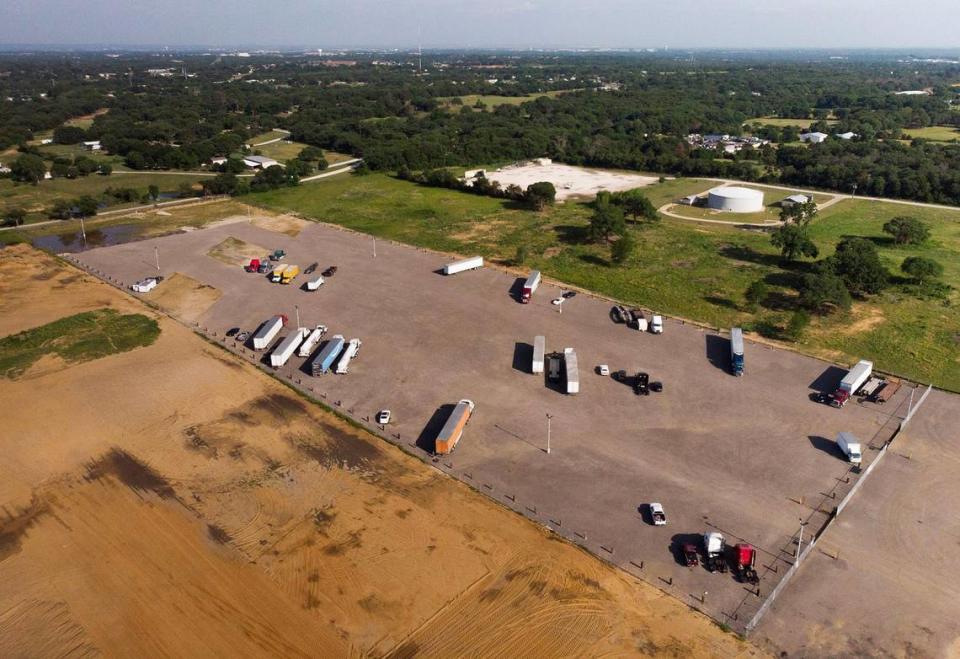
If there’s one thing about Tarrant County’s unincorporated areas, it’s that there are few rules, and the ones that do exist are hard to enforce.
And if you’re a homeowner looking to escape to the country as Tarrant County stretches past its limits in terms of growth, you have to be prepared.
You can have your land, views and freedom. So can your neighbor. It is a collision between property rights and a lack of zoning in unincorporated areas.
Everyone has a right to their opinion, Sterling says, and he’s tried to be as accommodating and neighborly as possible. At the end of the day, though, he’s following through with his plan to make a profit off his property.
“I know that doesn’t fit into somebody else’s plans, and I could see how they may not think that’s neighborly,” Sterling said. “But I’m sure if they bought that piece of property for business purposes, they would move forward with those plans whether the neighbors particularly cared for that or not.”
The Wild West
Zimmerman calls where she lives the Wild West.
Her neighborhood in unincorporated Tarrant County around Eden Road South and Dr. Garrison Road is just four miles from Interstate 20. Truck drivers exiting the road to park at Ranch Truck Parking have a short drive for a place to rest for the night.
The area could be a rural North Texas postcard. One Monday as day turned to dusk, the sun glowed through trees and shined down on greenery surrounding Neil Foreman’s back porch.
Foreman best describes what Sterling has done as something from Joni Mitchell’s “Big Yellow Taxi.” He has quite literally paved paradise and put up a parking lot.
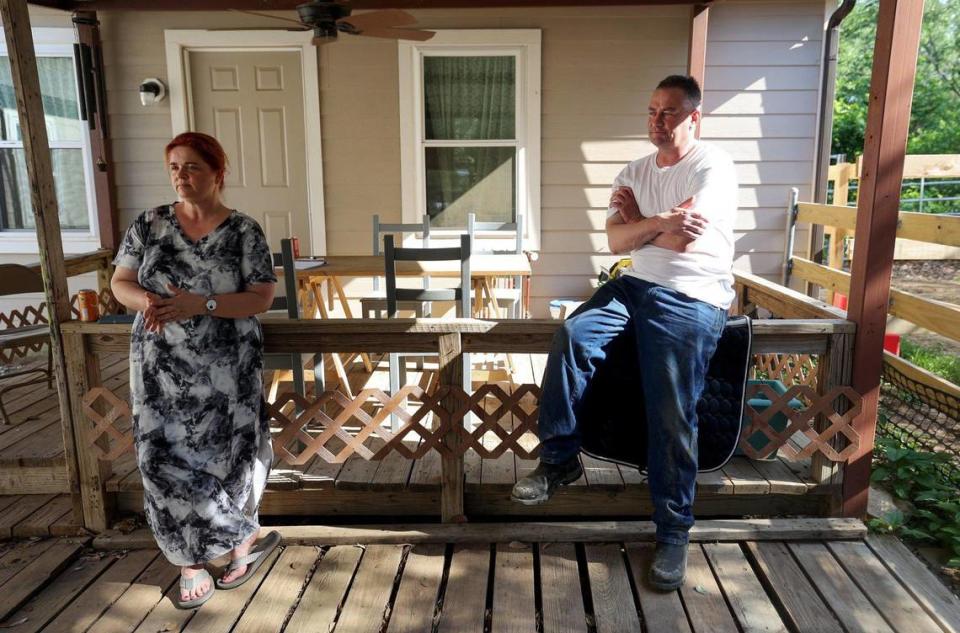
The blue-eyed Brit (he’s originally from London) is proud of his spot on Eden Road South. He practically had to build it back from the ground up to become something habitable.
At Charlie Blauvelt’s house, too, it’s serenity. His big, white house on Dr. Garrison Road has a pond, lush grass and a garden out front, complete with a chicken run.
Blauvelt used to wake up early to walk the whole block. Neighbors used to all have golf carts and drive to go see each other.
With the 18-wheeler trucks ripping up and down the street, no one walks down the road anymore, Blauvelt says. Light pollution from the truck lot, too, makes it hard to see the stars. The nearest big lights used to be at the Mansfield school district’s R.L. Anderson Stadium 10 miles away.
“It just doesn’t seem right to me that a company can have that much of an environmental impact,” Blauvelt said. “Because all of us are over here beautifying the neighborhood. We’re planting trees, we have bees, we have general gardening, we’re making everything beautiful and a better place to live and all they’re doing is destroying and destroying and destroying and making it a terrible place to live. It’s just a clash.”
Then comes the effect on property values. Homeowners worry they won’t be able to get their investment back.
The parking lot started to go up just as Blauvelt finished construction on his house.
“I thought, what did I just spend all this money on?” Blauvelt said.
Neighbors say it puts them in a trap.
What are the rules?
It’s worth noting that both fireworks and development come with some rules in unincorporated Tarrant County.
Development-wise, Tarrant County does not have the authority to establish or enforce zoning.
You can buy or sell fireworks and shoot them off in unincorporated Tarrant County, as long as it is 5,000 feet from city limits.
Last year, there were 107 fireworks stands in Tarrant County, according to fire marshal Randy Renois.
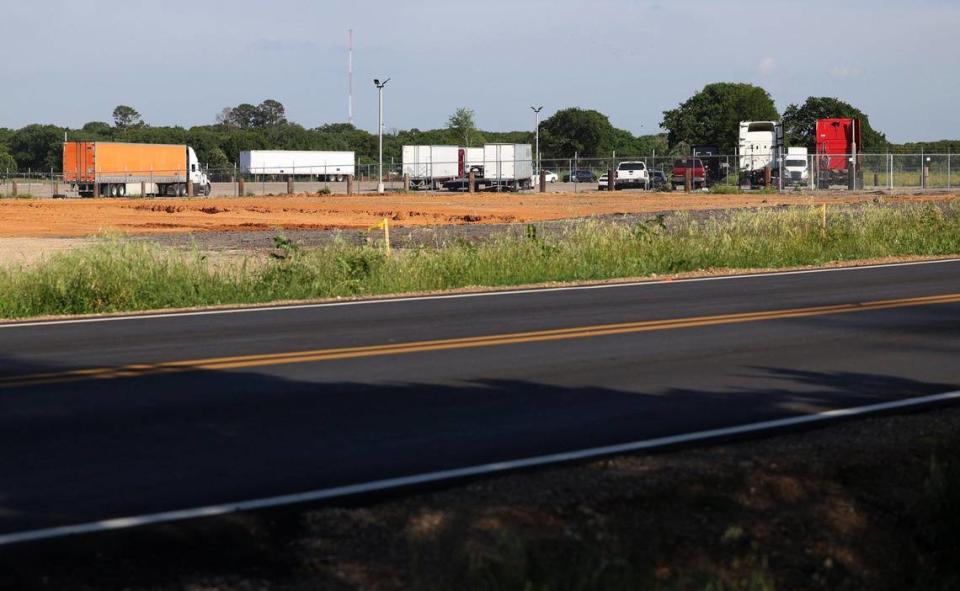
There are only two times a year you can buy fireworks in the county: The July season, which runs June 24 to midnight July 4, and the December season, which runs Dec. 20 to midnight Jan. 1.
And despite the short selling period, if you’re in an unincorporated area, fireworks are allowed to do what fireworks do 24/7, 365 days a year.
Since Sterling’s property is in unincorporated Tarrant County, he’s within the bounds of what’s allowed.
Renois said it is not hard to enforce the rules in the unincorporated areas. Many people don’t know about the county’s fire code, he said. But once they know it exists, they usually comply. And on the firework-launching holidays like the Fourth of July, the county sends patrols to monitor fireworks stands or answer calls about them.
Usually, it’s not the fireworks businesses that bring the issues, Renois says.
It’s the people using the fireworks.
Something they can’t prepare for
To some, being a Texan means freedom to do what you want, whenever you want. But what happens when that freedom encroaches on a whole other group’s livelihood, like the neighbors and animals surrounding Sterling and his businesses?
Sterling’s parking lot isn’t the only move toward industrialization in the area. On Eden Road South you’ll find a metal mill where shiny scraps climb high over a tall tan fence.
There’s already an encampment of people neighbors say stir up trouble. They worry people coming in and out of the trucking lot will bring more.
That isn’t the only obtrusion neighbors say Sterling’s business has caused.
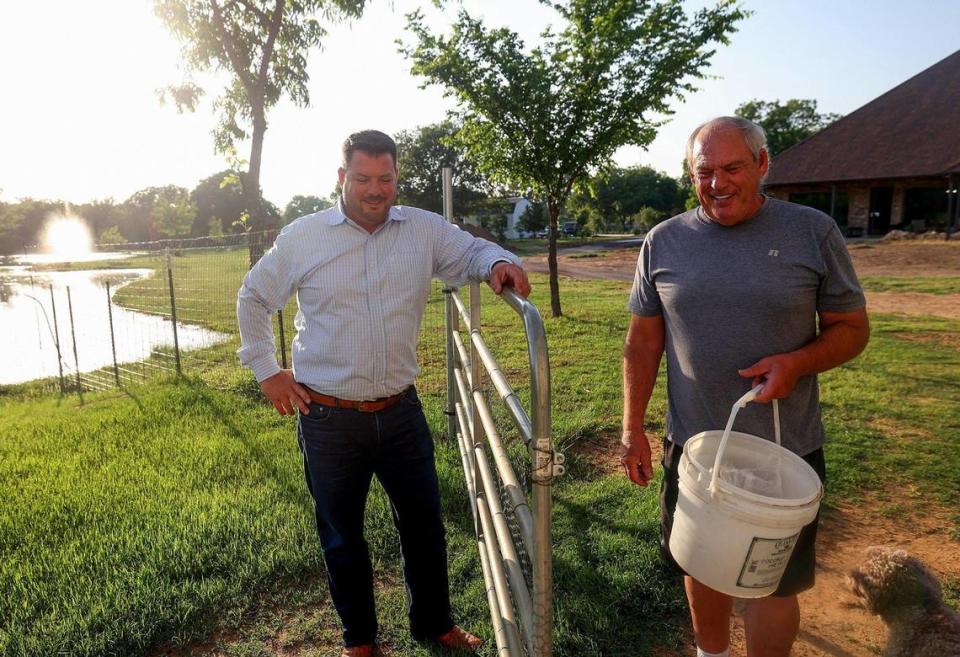
One Monday afternoon on Foreman’s porch, Zimmerman pulled up a picture of her front bedroom window from the middle of the night. If you didn’t know any better, you’d think it the sun was beginning to rise.
The lights from the truck parking lot were just that bright.
Zimmerman and Foreman have complained to Sterling before. They say he offered them each $100 to buy themselves blackout curtains. They could either do that, they say Sterling told them, or sue.
Sterling has since started turning on the lights at 2 a.m. Zimmerman says the sudden switch always wakes her up earlier than she has to be up.
The neighbors worry what could happen when the fireworks stand starts running and people begin to shoot them off over their homes.
Every year around New Year’s Eve or the Fourth of July, neighbors like Zimmerman and Foreman expect to have to sedate their animals to prevent freakouts.
But unexpected and unanticipated fireworks they can’t prepare for could affect Benji, Foreman’s chestnut-colored retired racehorse who’s never won a single race he’s run. Horses often run away when there’s a loud noise, and if they break a leg hopping a fence, it often ends in euthanasia.
They could affect Clyde, Zimmerman’s retired working border collie who spends his days parading with his companion Bonnie around 12 acres. He climbs on top of Zimmerman’s head when the loud noises start.
And they could affect Jack, the Blauvelt family’s teddy-bear-soft red kangaroo who eats Triscuits, yogurt and cashews. Last year Jack cost the family $6,000 in exotic vet bills to repair his broken leg when he hopped a fence after being startled by a mortar blast.

‘The first one there’
So how does one enter the fireworks business anyway?
Sterling says it was a way to get his sons a head start at making money.
He’s lived in the Mansfield area for nearly 30 years. He opened Joe Dirt’s Bomb Shack off FM 1187 when his sons were 14 and 16 and laws changed to allow fireworks in extraterritorial jurisdictions.
Lease problems at Sterling’s former truck parking site landed him on Eden Road South, and a lease problem at the former fireworks stand site led him place the stand on the property he had already paid for, he said.
Sterling said he hasn’t tried to form relationships with the neighbors. But the last thing he wants to do is have people feel like he’s doing something against them.
Sterling has gotten complaints about having to take down the trees on his lot.
“I’m a country boy from Missouri, and you know, I love the woods, love the trees,” Sterling said. “Last thing I want to do is take down trees, but I also didn’t buy a $900,000 piece of property to sit there and admire the trees.”
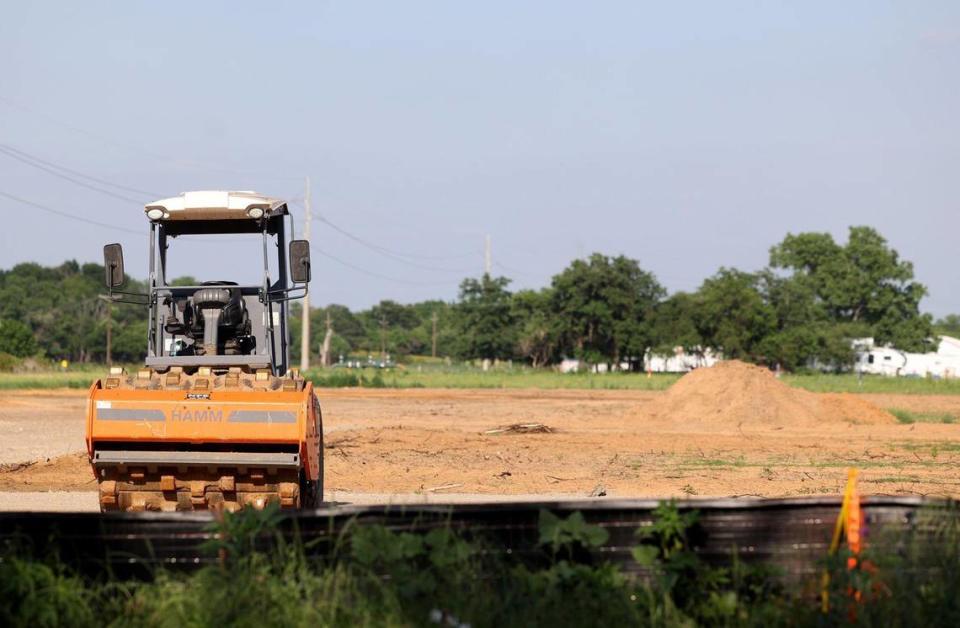
He’s heard complaints about the lights. He says he turned them so they faced more downward and offered to buy neighbors Amazon gift cards to buy blinds, but they weren’t interested.
“I really don’t know of any house that don’t have blinds on the windows, but OK, I guess then I can’t help you much,” Sterling said.
Sterling has experience with people doing things he doesn’t like with neighboring property. Someone bought property near his on FM 1187 and cleared the trees.
“I didn’t like that,” Sterling said. “But I can’t be mad at him. I mean, that was his prerogative. He spent the money, he has a business plan, he decided he wanted to buy that for the purpose of doing what he’s doing. I can’t be mad at him for that.”
Calls started coming in again when Sterling put his fireworks stand on the lot.
“I just feel like I’m being harassed,” Sterling said. “And I get they may not like some of the things, but I mean they have options as well. I mean, they can move away and move to the city where there are parameters, what people can and can’t do, or they could have bought the property, and they didn’t do either one of those.”
He disagrees with the notion he isn’t being neighborly.
But he pauses when he addresses the topic.
Sterling hopes the neighbors understand he’s trying to run a business. More commercialization in the area is coming, and Sterling believes if someone wants to control the land around them, they should buy it themselves. Otherwise, neighbors have to “let progress take its course.”
“They’re just mad at me because I’m the first one there.”
County explores options
Officials say they’re helping the families.
County Judge Tim O’Hare suggested the band of neighbors file a public nuisance lawsuit when they showed up to a Commissioners Court meeting May 2 to air their grievances.
Zimmerman says they’re working on it.
Representatives for O’Hare’s office say the judge has asked county administration to do everything in its power to help them out. His staff also plans to ask administrators for updates.
The community’s representative on the Commissioners Court, Alisa Simmons, said in text that she’s digging for solutions.
Simmons wrote in another text Wednesday afternoon that she planned to schedule a meeting with the property owners in the next week or two.
Blauvelt is a third-generation photographer whose family built a two-story studio in the 1980s, and neighbors behind the site protested it because they didn’t want to look at a two-story building.
So the Blauvelts promised they wouldn’t cut down trees. They promised to be as aesthetically pleasing as possible. Blauvelt said his parents promised to limit the businesses that would go in the building, and put up lights in the back.
They attended the neighborhood meetings to ask how they could make the situation better.
They had to be good neighbors, he said.

